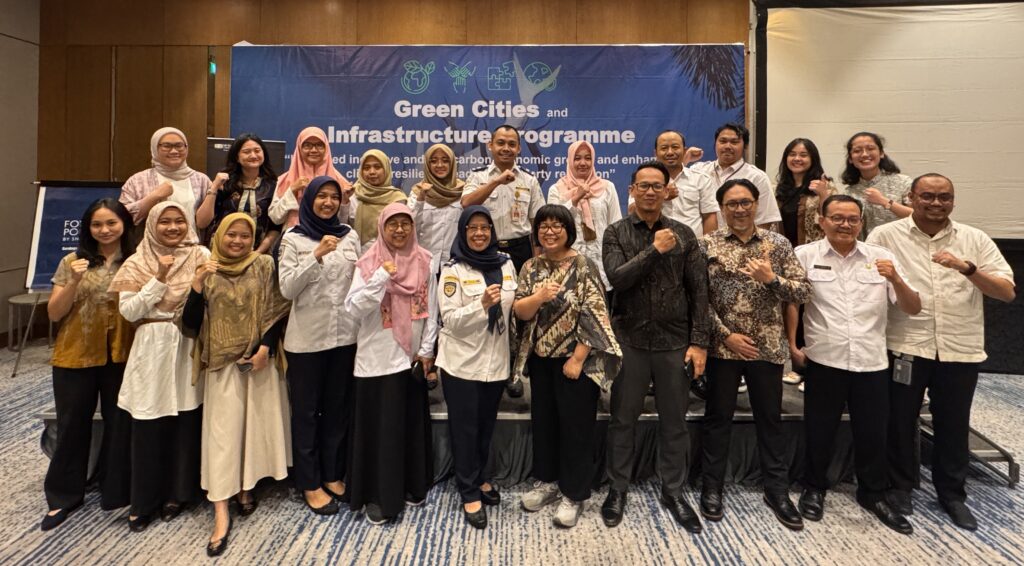- A roadmap for transit-oriented development (TOD) in the Surabaya metropolitan area (known as GKS+) is being refined, based on local needs.
- GCIEP recently delivered a public consultation and coordination meeting with diverse community groups and the local government.
- This underscored the importance of a flexible TOD roadmap that can adapt to real-world conditions, whilst driving sustainable growth.

Key stakeholders from the TOD coordination meeting.
Community groups and local government representatives from the Surabaya metropolitan area in East Java province, Indonesia, came together in August to have their say on TOD.
The Green Cities, Infrastructure and Energy Programme (GCIEP) delivered a public consultation and coordination meeting on 19 and 20 August, respectively, to share views on the TOD roadmap.
The Gerbangkertosusilo Plus (GKS+) region, including Surabaya city and surrounding urban areas, is a strategic area and a key driver of economic development in Indonesia. The Government of Indonesia has committed to transforming GKS+ into a globally competitive economic hub. This calls for greater investment and development, specifically for TOD, which involves creating high-density, mixed-use communities centred around public transit hubs.
However, public transport in the GKS+ area remains largely inaccessible, not only for vulnerable groups but also for the wider public. Infrastructure such as pavements, bus stops and related facilities do not adequately support walking, cycling or public transport use, making it difficult for people to adopt sustainable mobility.
This was a point of discussion at the public consultation on 19 August in Surabaya, which aimed to foster open dialogue, gather innovative ideas and capture community feedback to ensure that TOD processes reflect local needs.
The session drew strong interest from communities and urban planners alike, with attendance by organisations representing visually impaired people, people with hearing difficulties, women with disabilities – alongside FDTS (Surabaya Transportation Discussion Forum), MTI (Indonesian Transportation Society) and university academics.
By engaging these groups, the GCIEP team gained valuable insights into the barriers that limit access and mobility in the current transport system.
The importance of collaboration and flexibility in TOD
The public consultation was closely followed on 20 August by a coordination meeting with local government, convened by GCIEP, to ensure the TOD roadmap for GKS+ is anchored in national spatial planning policies.
Updates on the roadmap were shared with representatives from East Java provincial agencies (for the environment, transportation, planning and economic development) as well as the Surabaya City Department for Public Housing, Settlement Areas and Land Affairs.
It was noted that effective TOD requires collaboration between government institutions and the private sector to support integrated planning, mobilise investment and drive sustainable urban transformation. The meeting also underscored the importance of flexibility, allowing the roadmap to adapt to real-world conditions while preserving its overarching vision and objectives.
Denni Sasmita, a representative of the East Java Provincial Transport Agency, reflected on proceedings:
“The critical role of TOD is as a complementary strategy to building a reliable transit system within GKS+. The roadmap will serve as a key reference throughout the planning process, particularly in shaping regional regulations and development plans.”
The UK’s Green Cities, Infrastructure and Energy Programme is tackling climate change and extreme poverty by accelerating the delivery of sustainable green cities and climate-resilient infrastructure.
Published
03/09/25
